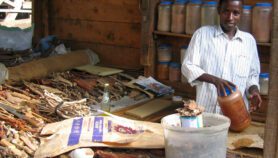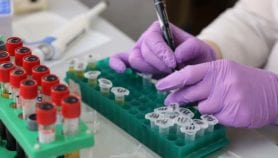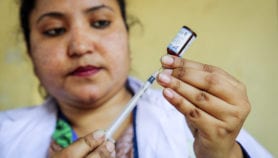Send to a friend
The details you provide on this page will not be used to send unsolicited email, and will not be sold to a 3rd party. See privacy policy.
[WINDHOEK] Namibia has kicked off a series of meetings with rural and indigenous communities to feed into the country’s first bill on access to genetic resources and traditional knowledge.
The first such meeting took place in the south of the country last month (28–30 June).
The bill has been in development since 1998. It should be finalised by the end of the year so that the country can sign the Nagoya Protocol — an international framework for ensuring more equitable access to, and sharing of, genetic resources — before the February 2012 deadline. To be ratified, the Nagoya Protocol needs 50 nations to sign up and 38 have done so far.
The bill will prevent exploitation of indigenous resources, such as devil’s claw (Harpagophytum sp.) a plant used by the San people to treat rheumatism and arthritis, and hoodia (Hoodia gordonii) which is used for suppressing hunger.
Pierre du Plessis, a genetic resources expert and Nambian negotiator for the Nagoya Protocol, said that investments made to bring some of these plants to the market have not given back much to local communities.
"In the case of hoodia an investment in the region of €50 million (US$70.7 million) over the past 12 years has, so far, yielded virtually no sustainable benefits, although some opportunists have enjoyed windfall profits," he said, citing attempts to market hoodia products for weight loss.
The workshops are an opportunity to strengthen people’s ‘environmental literacy’ — knowledge about their natural resources. "But we also need their expertise to prevent any loopholes in the bill," Nakwaya said. "After all, communities have used these resources for a long time."
"Communities will benefit if their associated traditional knowledge is involved, or if they are the direct legal providers of the resources in question," said du Plessis.
Namibia was one of the main architects behind the 2010 Nagoya Protocol, which secured access and benefit sharing (ABS) rights for communities under the UN Convention on Biological Diversity.
"Nagoya is a big step for the conservation and sustainable use of natural resources," said Dietlinde Nakwaya, the manager of a programme called Strengthening Capacity Enhancement to Implement the Global Environmental Conventions in Namibia, at the Ministry of Environment and Tourism — a project that builds capacity to implement international environmental agreements.
Part of the bill will be a platform where companies can file their applications to procure natural resources. This platform will also retain lawyers to assist communities in drawing up equitable agreements.
Konrad Uebelhör, biodiversity and sustainable land management expert with the German Company for International Cooperation, GIZ, (which formed recently from the German Development Service, the German Technical Cooperation, GTZ, and Capacity Building International, Inwent), said that, even if local communities do not manage to derive benefits from the IP relating to their knowledge, they can still benefit from the spill-over effects of developments and investments surrounding traditional knowledge.













